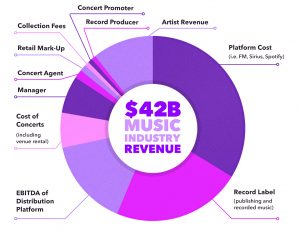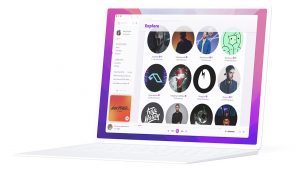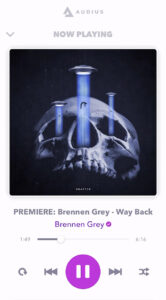Revolution in the music industry is nothing new. From vinyls to CDs to streaming — music fans now have access to the world’s entire catalog of music, past and present, in just a few clicks.
But artists haven’t had it as good. As streaming platforms like Spotify became necessary outlets for artists to be discovered, creators have received less and less money. Today, artists earn only fractions of pennies per stream, while the music industry’s revenue actually grew 18.5 percent to reach $25.9 billion in 2021.

By Audius’ calculations, artists only capture about 12 percent of an industry that generates upwards of $40 billion in revenue. Image: Audius
In response, Web3 music platforms have risen to give artists more control over their earnings, fanbase, and creative freedom.
Among them, Audius stands out for its Web3-loyal approach: decentralized, permissionless, and trustless. Artists can upload their music for free, bypassing gatekeepers like distributors. Users can also listen to music at no cost. And governance decisions are made through a DAO, where token holders vote on proposals.
Audius leverages blockchain technology to create incentives for its ecosystem to run. Node operators must stake tokens to host Audius’ content and are rewarded with more tokens. Artists can earn tokens based on streams accumulated and interactions with users. And fans receive more tokens the more they listen.

Launched in 2019, the platform centers Web3 principles to build a decentralized and token-based ecosystem that rewards both creators and listeners. Image: Audius
“It sounds kind of Marxist,” Roneil Rumburg, Co-founder and CEO of Audius, told Insider in April. “This idea that the means of distribution, in this case, should be in the hands of the people who actually use them.”
The company doesn’t make money at all from these token transactions: 90 percent goes to artists and 10 percent to the node operators. To fund its operations, it has so far raised $13.6 million from VCs including crypto fund Multicoin Capital and artists like Jason Derulo and Katy Perry. Their proposition is resonating with fans and artists alike: Audius now counts more than 100,000 artists and 4.5 million monthly active users.

Currently, Audius hosts music by more than 100,000 artists whose music reaches some 4.5 million monthly active users. Images: (clockwise from top left) Blondish, AK, AiDO, AN TY, Meridian, and Subfocus
However, it’s not all smooth sailing: in July, Audius suffered a $6 million hack that shook the community. The organization quickly responded and instituted necessary fixes. The hack was the latest example of the challenges of building a financially secure organization in the decentralized and open world of Web3.
Below, Rumburg gives his views on the state of the music industry, the challenges of decentralization, and what the future will look like for the industry.
Why did you start Audius?
In the early 2010s, my co-founder Forrest and I saw a need in the market emerge — specifically in the dance music community. Many of our favorite creators were leaving Soundcloud due to a variety of changes Soundcloud made around that time, and we felt that if creators were enfranchised more in policymaking, Soundcloud could have avoided these issues. We set out to create a user-owned and user-managed commons for content distribution, and that eventually led to the founding of Audius in early 2018.

“Web3 technologies are the enablers,” says Audius’ Roneil Rumburg. Image: Brennen Grey’s “Way Back” was released in July as an Audius exclusive
What, and why, needs disrupting in the music industry?
Audius doesn’t disrupt so much as it augments. Simply put, the network creates new revenue streams for artists. Those new revenue streams are targeted at the most highly-engaged sub-segment of an artist’s fanbase. Over time, we believe these streams will eclipse other sources of digital revenue.
The current market dynamic in music is overly controlled by intermediaries — we believe Audius is the logical conclusion to fixing that. We like to think we have helped create the perfect music commons, where there is nobody (not even ourselves) sitting between the artist and fan.
What have been the challenges of decentralizing the industry?
In the music industry, decentralized technology has a perception problem more than anything else. People are often fearful of what they don’t understand, and often erroneously associate today’s decentralization movement with early 2000s P2P software. Audius has been able to show that it’s possible for a decentralized ecosystem to have a thoughtful and highly functional content moderation system.
What is the risk that people might not appreciate music as much, now that they don’t have to pay for it (unlike with a streaming service such as Spotify)?
That’s not quite accurate — Audius seeks to give creators control over how their music can be heard, by whom, at what price point. If some artists choose to make content free and others choose to charge fans per listen, that is their prerogative, in our view.
That said, I also just don’t believe fans will ever stop appreciating music or other art for that matter. For many people, music and art doesn’t just improve their daily lives, they have changed their lives, brought them together, provided some of the best memories and experiences for them. That is what music and art do — and I don’t think that is going anywhere.
In the next few years, how do you see Web3 technologies play out in the music industry? Is this the beginning of a new era?
I believe it is. But Web3 technologies are the enablers; direct fan relationships, and engagement/monetization across those relationships, which are possible for the first time today, will be the drivers of the music economy of tomorrow.



